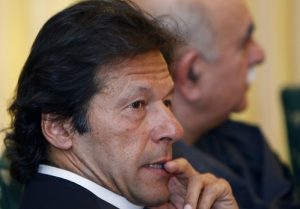Imran Khan, the legendary cricket player, is larger than life in Pakistan. His fame, persona, and charisma go back to his cricket days when he mesmerized the cricket world with his dazzling performance and style, not to mention leading Pakistan to become the World Champion in 1992.
Mr. Khan, 58, is long retired from cricket. But, now, he has brought his fame, charisma, along with patriotic endeavors into the political realm of Pakistan. The question is does he have the necessary skills to bring about Pakistan from the rising unemployment and inflation, diplomatic fallout with the U.S., testy relationship with India, and ongoing unrest between the reformists and the fundamentalists?
It is one thing to woo the crowd with his skills as a cricket player but it is quite another to lead a country that is rife with internal and external economic, political, and social problems. As a politician, Mr. Khan cannot solely rely on his charm to tackle them.
Ironically, he has done just that so far and it has worked in his favor. His popularity surging, Mr. Khan spoke before a large crowd in Lahore recently. But his speech did not have clear policy implications. He talked about corruption and called for an “investigation” to examine the “assets” of his opposition party members and openly criticized Pakistan’s relationship with the U.S. and its drone attacks.
His rhetoric may have skimmed the surface of the problems in Pakistan, which will hold the general election in 2013. And from here on out, Mr. Khan must convince his supporters and opposition alike about the strength of his resolve and the substance of his message.
Foreign policy
The relationship between Pakistan and the U.S. must be re-examined through a skillful, pragmatic, and achievable policy options. Since 9/11, the U.S. literally has dictated what should and needs to be done and how to combat terrorism. Money poured in from Washington into the pockets of the Pakistani generals by the buckets. According to a report by The Times of India, the U.S. aid to Pakistan since 9/11 has reached nearly $20 billion. During the Obama administration, the aid to Pakistan has gradually risen, from $2 billion in 2008 to $3 billion in 2009 and $4 billion in 2010.
This policy of undue influence must be challenged. But in doing so, Mr. Khan may not afford to anger and alienate the U.S. Both countries have a large stake in resolving the terrorism and insurgency issues. For the U.S., it means an assurance and enhancement of its national security, and for Pakistan, it means nonproliferation of fundamentalism in Pakistan.
Mr. Khan’s open critique of U.S. foreign policy towards Pakistan equally needs to be challenged by measurable and sustainable policy options. Not an easy task, but given his international charisma, oratory and political skills, and pristine education (he is an Oxford alumni), Mr. Khan is by far the best candidate to achieve a diplomatic and political footing with his powerful counterparts in Washington.
Domestic policy
Rampaging corruption in Pakistan has a devastating effect on its current economic and social conditions. According to 2010 Transparency International’s Corruption Perception Index (CPI), Pakistan currently ranks 143 in the world.. Aside from the ranking, what is most important is that corruption has seeped into literally every sector of governance, from the police to the judges. Controlling corruption in Pakistan would be a potent challenge for Mr. Khan.
What works for him?
The intense popularity is a big asset for Mr. Khan. He has skillfully capitalized this to enter into Pakistan’s political arena. Now, his focus must shift to outlining and implementing policies of reform. Mr. Khan’s supporters are young and hungry for change. That is also a driving force of reform. Guiding the younger generation to a meaningful political, economic, and social change holds a promising future for Pakistan.
What works against him?
Political assassinations are endemic in Pakistan’s political history. In fact, throughout South Asia, assassinations took lives of many promising and rising political stars determined to bring reform. One of Mr. Khan’s strategies should be to work closely with Army, Inter-Service Intelligence (ISI), and political leaders to create an alliance of governance. Ignoring and rebuking their roles in Pakistan could be costly. Mr. Khan has kept a non-threatening relationship with the army so far. But he needs to convince the army that his intention is to create an alliance to secure the sovereignty and democracy of Pakistan should he win the election.
Looking ahead
The 1992 World Cricket championship still reverberates through the Pakistanis and the South Asians. Just as he weathered his cricket career almost 20 years ago, from despair of losing captaincy of the national team to losing close matches, Mr. Khan now has an opportunity to steer his nation from the gloom of disparity to the exuberance of resolve. The “Kaptaan” must see to it.








I sincerely hope that someone like this man comes to power in a volatile state such as Pakistan. I really see a ray of hope in this man and his party. BTW, i have no country because whole Earth is my home.
Just like Mr Khan, i truly hope that in India someone like Mr Kejriwal should be given a chance.
May Allah lead all parts of EARTH i.e. all nations to prosperity!